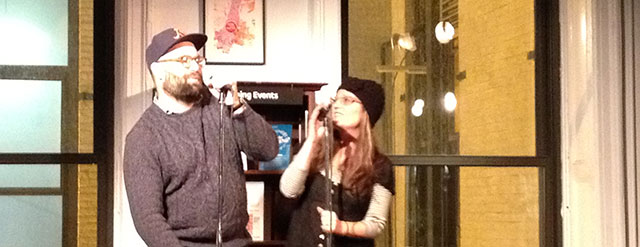
To leave, or not to leave New York City is a question suddenly in the literati’s zeitgeist. Talk of leaving New York City began either in 1968 with the publication of Joan Didion’s essay “Goodbye to All That” or in October with the publication of a collection of essays Goodbye to All That: Writers on Loving and Leaving New York. The collection was edited by Sari Botton and immediately joined the conversation with a launch party at Powerhouse Arena.
Since the launch, the conversation has continued with great fervor. Fueled in part by de Blasio’s populist mayoral campaign (and the twelve years of a billionaire mayor) along with a growing, nationwide disparity in wealth, one major theme has been how the cost of housing has driven writers from the city. Some people leave of course, because they were never really New Yorkers, and never really belonged. Others will leave for jobs or for lovers. The ever trendy New York Times even wrote a trend piece about the leaving-New-York-essay trend.
The collection of essays Botton assembled is a mix of A-list writers, some still living in the city, some now exiled. A frequent theme, like any good New York real estate conversation, includes money, who has it, and who doesn’t. The success of the book inspired Should I Stay or Should I Go, an event hosted by Vol 1. Brooklyn celebrating the discourse surrounding the question of departing. Sari Botton and Vol. 1 editor Jason Diamond lead the event at Housing Works. They were joined by a who’s who of New York’s internet set.
Even between the two hosts, the issue of departing seemed unresolved:
“I can’t leave New York,” Diamond said.
“I wish I didn’t have to,” Botton retorted.
Diamond then lamented that he sort of wanted to leave, but is stuck here.
“Sometimes you love it and sometimes you hate it,” Botton added before introducing the evening’s first reader.

Elissa Bassist is an editor of the Funny Women column for The Rumpus. She currently lives in New York and read an essay about her first years in the city: she arrived in New York as a student afraid to leave her apartment except to attend class. She hated the parks near her house because they were filled with nannies and spoiled children, and then later in the evening filled with their parents.
She hated Williamsburg, where everyone made her feel old. But then she discovered horror films on Netflix. Partly she hoped that films like The Human Centipede might make her forget the parts of the city she disliked. But even the The Human Cinpede seemed less disgusting than New York City. The city is a place filled with horrors–but watching horror films helps make it better. She concludes: as long as she has horror films to watch, she can stay in New York City. (She also correctly uses “on line” in place of the non-New York phrase “in line.”)
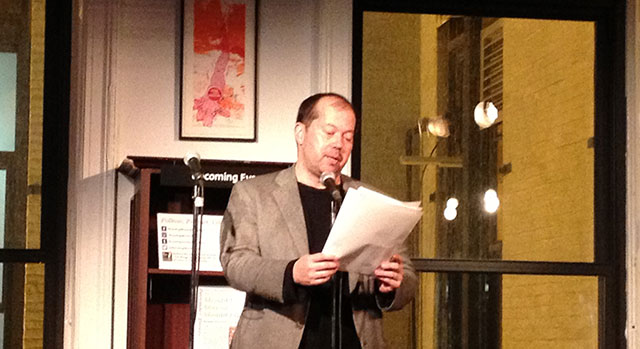
The next reader arrived in New York well after college. Alexander Chee now teaches at Sarah Lawrence, but his first job in New York involved cataloguing surplus pulp romance books in a warehouse in Queens. Chee’s read a portion of an essay that will appear next year in a collection from N+1 entitled MFA vs. NYC, an examination of the conflicting points of view between writers in creative writing programs and those in the New York City publishing world.
Chee’s essay centers around his time attending Wesleyan University where many New York City high schools send dozens of students. For many of his peers, college was high school part two. All his friends seemed surprised he wasn’t a native of the city. His first real night out in New York involved a classmate’s birthday and the famous New York City club Area. The bouncer parted the crowds and allowed him to enter, and ever since it seemed to him to represent the awe of the city. Years passed before he properly moved to town, but he still thinks of that first time in the club as the experience of moving to New York.
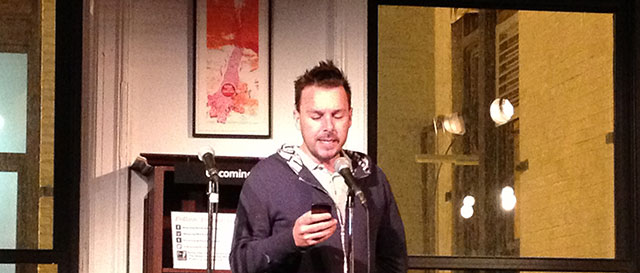
Choire Sicha, founder of The Awl, read next. He is also the former editor of Gawker. He read an excerpt from his current project, a list of all the people who have died in New York City. He expects to expire himself before finishing the list. His essay is a reminder of the link to the city’ past: the literary, the financiers, and the quirky. Its a funny piece that follows several incidents from the lives of Herman Melville, JP Morgan and others, as well as pointing out the year it became illegal to dump animal carcasses in the Hudson (1851) and that in the 1930s, the department store S. Klein had glass rooms to hold shoplifters allowing passersby to stare at the crying women inside.
Chloe Caldwell recently returned to the city, sort of. She’s currently living off of the Metro North line in Hudson, but by comparison to other cities in her recent past, she is essentially back. Her essay looks at how easy it is to understand why people do leave the city; “its so hateable. Its disgusting,” she says, but follows up by saying, its “love at first inhale.” She relates some funny memories, like the time, stoned on coke, she bought a thong on a whim, because she wanted to have anal sex.
She lived in Williamsburg, a “Disneyland,” thinking she would never leave. But then she slowly slipped out of the city, first heading to Greenpoint, then Inwood, and then away altogether. She always thought she wanted to leave before she hated the city searching for other Disneylands, and then she did, and there seemed a hint of regret. She wanted the city to always provide her that high she had the first time she moved here–like falling in love, it can happen only once.
Caldwell’s essay was heavy on the scatological references and Jason Diamond jokes that the next panel should involve all the bathroom experiences in New York City.
Flavorwire editor Michelle Dean read next (Diamond also writes for Flavorwire). She prefaces her reading by saying its her first ever, but she handles it like a pro. She currently resides in the city, but getting here required crossing international boundaries. She’s originally Canadian. New York seemed almost mythical, like Narnia she says. “People like me didn’t go to New York,” she explained. But earlier in her career, she was being interviewed for a job in New York. The legal firm flew her to the city hoping to hire her. She disliked the firm describing them all as characters from the game Monopoly. But still, it was New York. On what seemed like a whim, she took the job offer.
She worked for the law firm for five years hating most of it, but “New York was the only thing I’ve done right in my life,” she said at the time. It never seemed appropriate for her to leave the job she hated (and she had immigration concerns). Finally though, she left. It also meant returning, temporarily, to Toronto. But eight months away and she was back–just like Joan Didion, she says.
Sari Botton confirms that Didion did indeed return to the city, “yeah, she came back. She had a lot of money.”
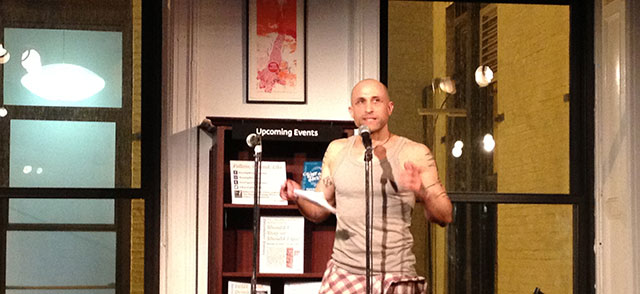
A common concern of those threatening to leave the city is the kind of lifestyle that lays beyond the Hudson River. Jon-Jon Goulian addressed that concern in his essay. He discussed his friend, Wade, who travels around the country writing letters to Goulian. Every place Wade visits is better than New York, according to Wade’s letters. In one example, he cites New Orleans as having better music, with the bonus that its more authentic; for another, Vancouver has hotter chicks than New York, and the bonus–they don’t act like it. But Wade always comes back to the city, Goulian explains, staying just until a girl dumps and he has no place to sleep.
Ultimately, New York is always better than all of these places–all except, one. Or at least, that exception in abstraction. Goulian concedes that Los Angeles offers many advantages over New York when it comes to house parties–plenty of bathrooms, plenty of space, distance from the neighbors, and most importantly, patios. Goulian says he returns to southern California on brief pilgrimages each year as a way of refilling that feeling, but in the end, always ends up returning to New York.
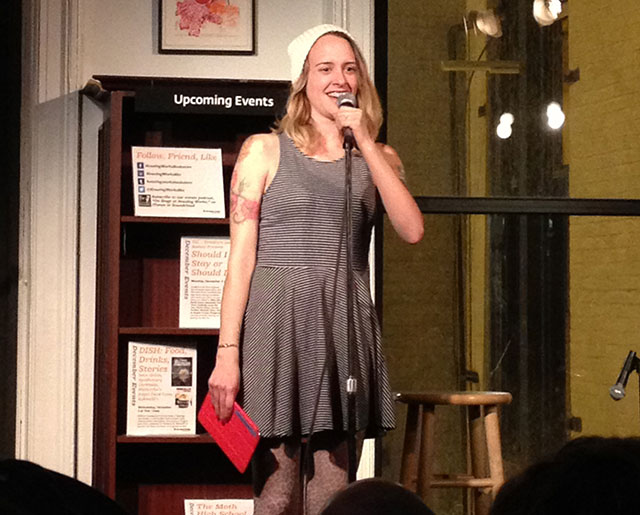
Gawker alum Emily Gould also has an essay in the forthcoming book MFA vs. NYC. She says that while Chee is playing on team-MFA, she is clearly team-NYC. Gould, who is co-founder of Emily Books also read at the launch of Goodbye to All That. For Gould, New York is a necessity, but one she has been forced to give up from time to time. She’s been exiled to Russia and most recently to just outside the city, in Hudson.
Gould has a novel forthcoming in 2014, but the cost of living in the city temporarily caught up with her and she and her cat escaped the oppressive rent situation by temporarily heading northward. She also learned at the time that her cat was dying of cancer. She jokes about drinking alone, because that is the sort of thing that happens in the far away places. She felt her New Yorkness slipping away. Her essay described a trip to the city where “the subway contained too many people.” There suddenly seemed a rush of information she was no longer accustomed to. Despite her incorrect use of “in line” over the preferred New York phrase “on line,” its obvious her departure from the city has pained her.
New Buzzfeed Book editor Isaac Fitzgerald has only been living in the city for seventy-two hours, give or take. He arrived on Friday from San Francisco, a city he ended up in because he was chasing a girl after college. San Francisco stuck on him long after the girl left. He worked odd jobs waiting tables and worked his way up to being the “world’s worst sushi chef.” He also edited The Rumpus.
For Fitzgerald, over time, the distance of San Francisco from his east coast based family proved too much. He was in New York often for business. His brother was having a baby. The space he wanted from his parents seemed too great, and so he decided to finally at last come to New York. And already he has found that the vastness of the city affords him all the space he ever needs.
Anna Holmes, the founding editor of Gawker’s site Jezebel and author of The Book of Jezebel: An Illustrated Encyclopedia of Lady Things, read through a list of comparatives weighing the positives of living in the city to the negatives. A few of her selected pros and cons included: The New York times versus the New York Post; dolphins versus dolphins dying in the river; old hipsters versus new hipsters.
The last reader was Mike Albo, as much a stand up comedian as author. He arrived in the city twenty-years ago, and while there is no indication he ever plans on leaving, he certainly has seen some changes. The city he arrived in had cheap diners and bodegas, but now, he says, people eat at overpriced restaurants called Diner and Bodega. He notes too that the city is now littered with French Macaron shops. He imagined his life, he says, a lot like Paul Austers, but with more cocks around.